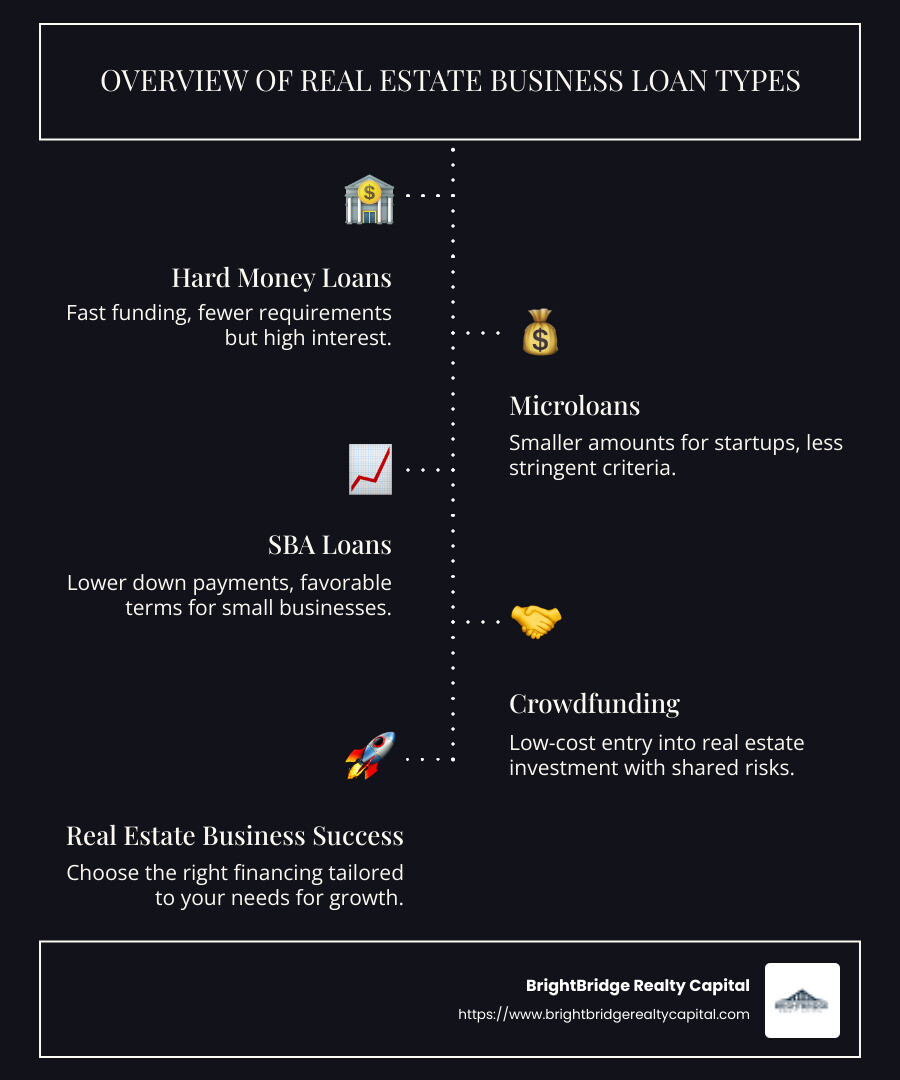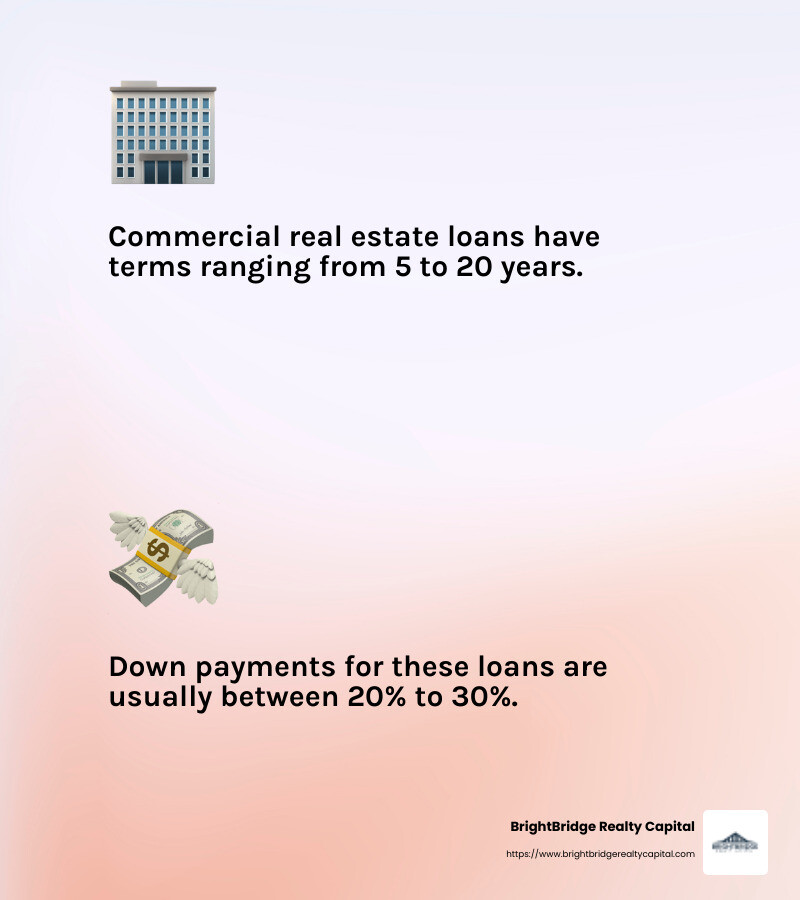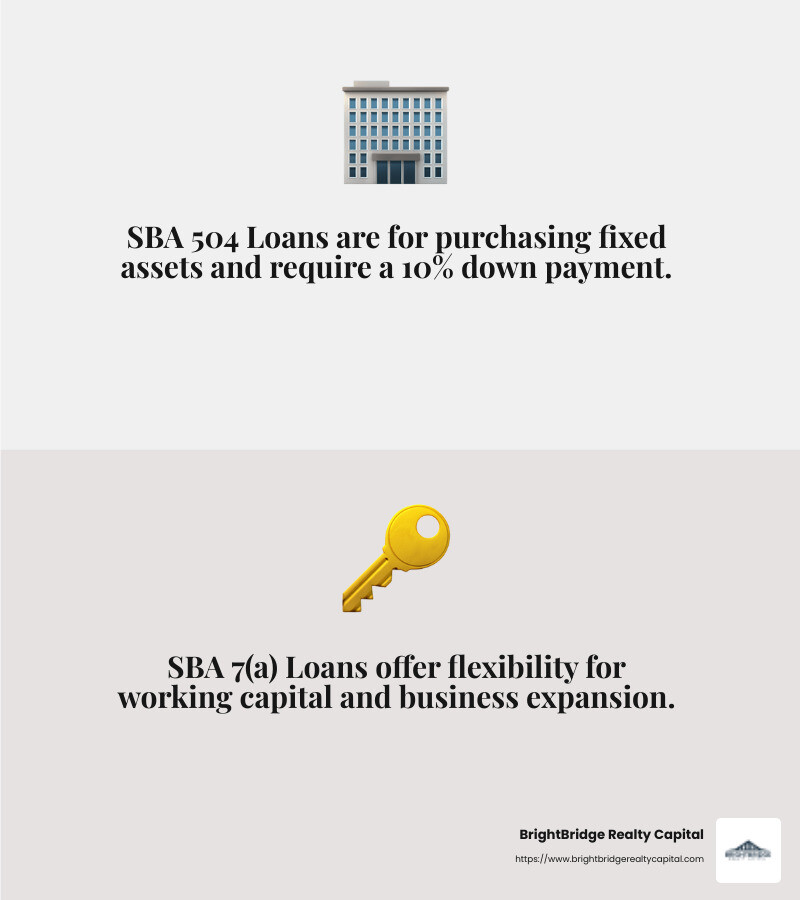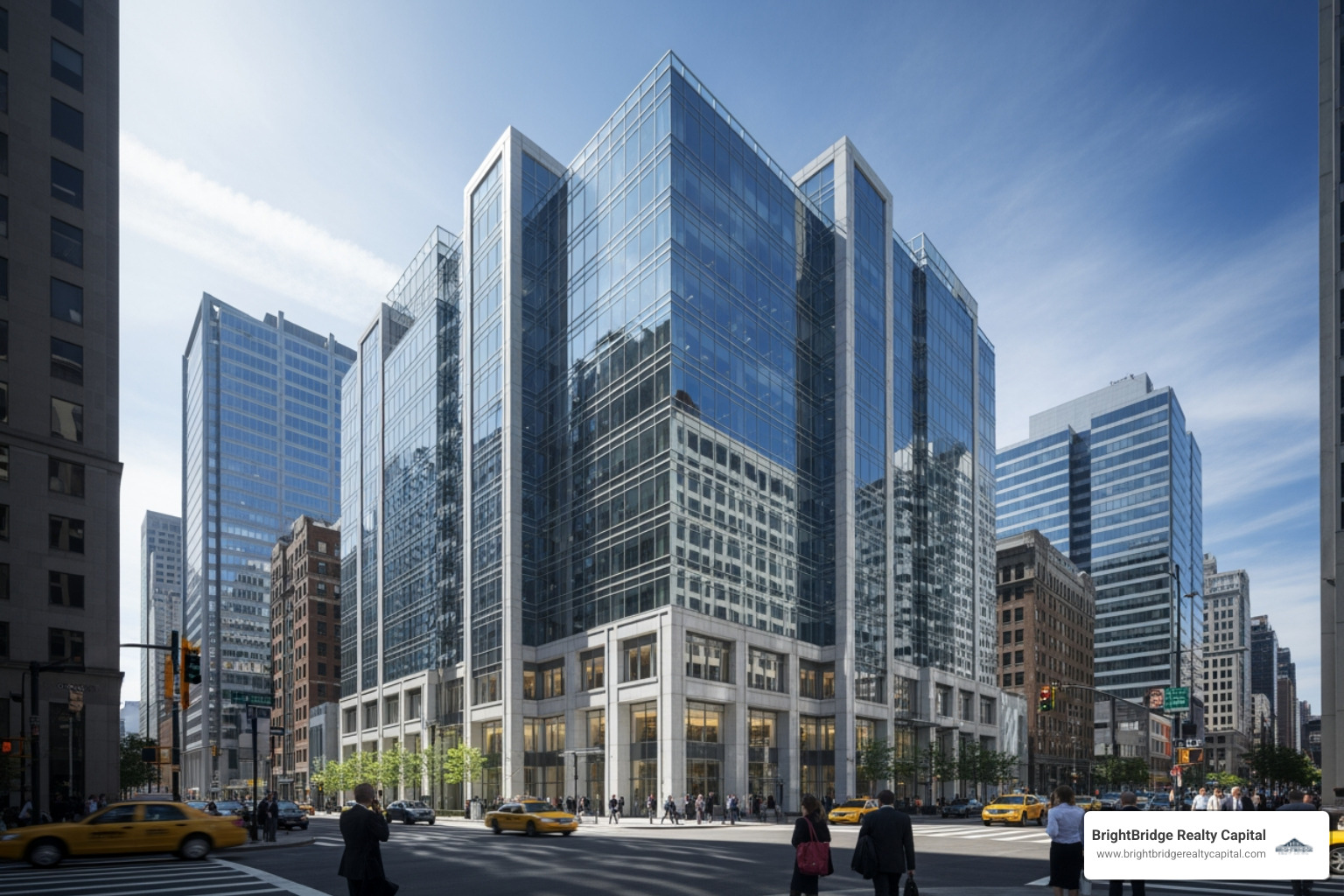The Blueprint to Real Estate Business Loans: A Guide for Entrepreneurs

Real estate business loans can be the key to open uping the potential of your property investments. As a real estate investor, you might seek quick and flexible financing solutions to expand your rental portfolio or seize fix-and-flip opportunities. Here’s a quick guide on what you need to know:
- Hard Money Lenders: Fast funding, fewer requirements but high interest.
- Microloans: Smaller amounts for startups, less stringent criteria.
- SBA Loans: Lower down payments, favorable terms for small businesses.
- Crowdfunding: Low-cost entry into real estate investment with shared risks.
In today's competitive real estate market, securing the right financing is crucial for success. Whether you’re just starting or looking to grow, different loan types cater to varied needs and circumstances. From hard money loans to SBA-backed options, each type has its own benefits and considerations.
Stay tuned as we dive deeper into these options and guide you on how to steer the changing landscape of real estate financing. Our goal is to empower you with the knowledge to make confident financial decisions and capitalize on lucrative opportunities swiftly and efficiently.

Understanding Real Estate Business Loans
Commercial real estate loans are designed specifically for business purposes. These loans are secured by a lien on a commercial property, which could include offices, retail spaces, hotels, or apartment buildings. Unlike residential mortgages, commercial real estate loans are typically shorter in term, often ranging from 5 to 20 years. The repayment structure might involve a longer amortization period with a final balloon payment.
Commercial loans are generally more expensive than residential loans. Down payments can be hefty, usually between 20% to 30% of the property's purchase price. Interest rates can also be higher, especially for those without strong creditworthiness or financial history.

Mortgages for Real Estate Businesses
A mortgage is a loan specifically for purchasing real estate. In the context of real estate business loans, a mortgage might be used to acquire commercial properties. The terms of these mortgages vary, but they often require a substantial down payment and come with higher interest rates compared to residential mortgages.
Fixed assets play a critical role in these transactions. Fixed assets refer to long-term tangible pieces of property or equipment that a business owns and uses in its operations to generate income. This might include buildings, machinery, or land. When securing a real estate business loan, these assets often serve as collateral.
Understanding these elements is key to navigating real estate business loans. Whether you're looking to expand your real estate portfolio or invest in a new property, knowing the intricacies of these loans will help you make informed decisions.
Types of Real Estate Business Loans
When it comes to real estate business loans, there are several options available, each catering to different needs and circumstances. Here’s a breakdown of the most common types:
Hard Money Loans
Hard money loans are a go-to option for real estate investors who need quick access to funds. These loans come from private lenders rather than traditional banks, which means they can be secured much faster. They are especially useful for projects that banks might consider too risky. However, the trade-off is higher interest rates and shorter loan terms, often just one to two years. Borrowers should be confident in their ability to repay these loans swiftly to avoid hefty costs.
Microloans
Microloans are ideal for startups or newer businesses that need a smaller amount of capital to grow. These loans typically top out at $50,000, with an average loan amount of around $13,000. While microloans have higher interest rates than traditional loans, they offer more lenient qualifying criteria, which can be beneficial for those just starting out. That the smaller loan amounts mean they are best suited for businesses with lower overhead costs.
SBA Loans
The Small Business Administration (SBA) offers several loan programs designed to support small businesses, including those in real estate.
SBA 504 Loan
The SBA 504 Loan is aimed at long-term financing for the purchase of fixed assets like land, buildings, and machinery. These loans are provided through Certified Development Companies (CDCs) and can go up to $5.5 million. They are a great option for businesses looking to expand through the acquisition of significant assets.
SBA 7(a) Loan
The SBA 7(a) Loan is the SBA’s most popular loan program, providing up to $5 million for a variety of uses, including working capital, purchasing land, and refinancing existing debt. This program offers flexibility and is backed by a loan guaranty, making it a reliable choice for many real estate professionals.
Each type of loan has its own eligibility requirements and potential benefits. Understanding these options will help you choose the right financing path for your real estate business.
How to Qualify for Real Estate Business Loans
Securing a real estate business loan can be pivotal for growth, but knowing how to qualify is essential. Here’s what you need to know:
Eligibility Criteria
Each type of loan has specific eligibility requirements. For example, SBA 504 Loans require your business to operate as a for-profit entity with a tangible net worth of less than $20 million and an average net income of less than $6.5 million after taxes over the past two years. In contrast, hard money loans often have looser requirements, focusing more on the value of the property rather than the borrower's credit history.
Microloans are more lenient with credit scores but are capped at smaller amounts, making them ideal for startups. SBA 7(a) Loans require businesses to be for-profit and to have exhausted other financial resources before applying.
Creditworthiness
Your credit score plays a significant role in qualifying for most loans. Lenders assess your credit history to gauge reliability. A higher credit score can lead to better terms and lower interest rates. However, for loans like hard money loans, the focus might be more on the property value and less on your credit score, providing flexibility for those with less-than-perfect credit.
Loan Application
The loan application process can vary based on the type of loan. For SBA loans, you’ll need to gather comprehensive business and personal financial information. This includes tax returns, financial statements, and a detailed business plan. Working with a Certified Development Company (CDC) can help streamline the process for SBA 504 Loans.
For hard money loans, the application process is typically faster. You’ll need to provide information about the property and your plans for it. Microloans require less documentation but be prepared to explain how the funds will be used to grow your business.
Navigating these requirements effectively can open doors to the financing you need to expand your real estate business. Understanding the nuances of each loan type will help you prepare a strong application and increase your chances of approval.
Top Real Estate Business Loan Options
When it comes to real estate business loans, there are several options available to entrepreneurs, each with unique features and benefits. Let's explore the top choices:
SBA 504 Loan
The SBA 504 Loan is ideal for businesses looking for long-term financing. It provides funds to purchase fixed assets like real estate and equipment. The loan is facilitated through Certified Development Companies (CDCs), which are nonprofit partners of the SBA. With a maximum loan amount of $5.5 million, it's perfect for major business growth and job creation projects.
SBA 7(a) Loan
If you need working capital or funds for business expansion, the SBA 7(a) Loan is a versatile option. It offers loan guarantees, which make lenders more willing to provide funding. This loan can cover a variety of needs, from purchasing land to refinancing debt. The maximum loan amount is $5 million, and it’s known for its flexibility and broad use cases.
Hard Money Loans
For those needing quick funding, hard money loans are a viable option. These loans are provided by private lenders rather than traditional banks, allowing for faster approval times. They focus more on the property's value than the borrower's credit history. However, they come with higher interest rates and shorter terms, usually requiring repayment within a year or two.
Microloans
Microloans are perfect for startups or small businesses needing smaller amounts of capital. With loans up to $50,000, they offer startup capital without the stringent credit requirements of larger loans. While the average loan amount is around $13,000, they can be a great stepping stone for new entrepreneurs to kickstart their business.
Real Estate Crowdfunding
Real Estate Crowdfunding has democratized property investment, allowing individuals to participate in investment projects with smaller amounts of money, sometimes as low as $1,000. It offers diversification opportunities, enabling investors to spread risk across multiple properties. However, investors should be aware of the risks and potential for longer waits on returns.
Choosing the right loan depends on your specific business needs, financial situation, and growth plans. Each of these options offers unique benefits, so it's crucial to assess which aligns best with your goals.
Frequently Asked Questions about Real Estate Business Loans
What is the difference between SBA 504 and 7(a) loans?
SBA 504 and 7(a) loans are both popular options for small businesses, but they serve different purposes.
SBA 504 Loan: This loan is geared towards businesses looking to purchase fixed assets like real estate or equipment. It's ideal for long-term investments and is facilitated through Certified Development Companies (CDCs). The maximum loan amount is $5.5 million, and it requires a 10% down payment from the borrower. One key restriction: it cannot be used for working capital or inventory.
SBA 7(a) Loan: This is a versatile loan option that can be used for a wide range of business needs, including working capital, purchasing land, and refinancing existing debt. The maximum loan amount is $5 million. It offers flexibility in use, making it a go-to choice for business expansion or startups.

Can SBA loans be used for real estate investment?
Generally, SBA loans are designed to support business operations rather than real estate investment. However, if the real estate is part of your business operations—like purchasing a building to house your business or expanding your business facilities—then SBA loans can be used. The key is that the property must be owner-occupied, meaning your business must occupy at least 51% of the space.
How do I apply for a real estate business loan?
Applying for a real estate business loan involves several steps, but with the right preparation, it can be a smooth process.
Assess Your Eligibility: Check your credit score and ensure your business meets the basic requirements of the loan you're interested in.
Gather Documentation: You'll need financial statements, tax returns, a business plan, and details about the property or project.
Choose the Right Loan: Decide whether an SBA loan, hard money loan, or another type suits your needs.
Find a Lender: Use a lender match service or reach out to banks and financial institutions that offer the loan type you're interested in.
Submit Your Application: Complete the application process, providing all necessary documents and information.
Work with a Specialist: Many lenders offer specialists to help guide you through the process and finalize your loan.
By following these steps and preparing thoroughly, you can increase your chances of securing the funding you need to grow your real estate business.
Conclusion
Navigating real estate business loans can be complex, but with the right partner, it becomes much simpler. At BrightBridge Realty Capital, we specialize in providing customized financing solutions custom to meet the unique needs of real estate investors. Whether you're flipping properties, constructing new buildings, or expanding your rental portfolio, our team is equipped to support your financial journey.
One of our standout features is our commitment to fast closings. We understand that in real estate, timing is everything. That's why we offer a streamlined process that can often have you funded within a week. Our direct lending approach cuts out the middleman, ensuring you get competitive rates and a seamless experience.
Choosing BrightBridge Realty Capital means choosing a partner who is dedicated to your success. With our nationwide reach and expert guidance, you can confidently pursue your real estate ambitions. Explore our real estate financing options and find how we can help bridge the gap in your investment strategy.


